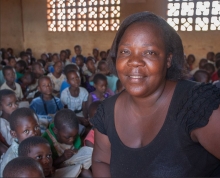Mistreated: The tax treaties that are depriving the world’s poorest countries of vital revenue

Women and girls in the world’s poorest countries need good schools and hospitals. To pay for this, these countries urgently need more tax revenue. A little-known mechanism by which countries lose corporate tax revenue is a global network of binding tax treaties between countries. This report marks the release of the ActionAid tax treaties dataset – original research that makes these tax deals made with some of the world’s poorest countries easily comparable and open to public scrutiny.
The Mistreated report is based on research that has for the first time examined more than 500 international tax treaties that low and lower-middle income countries in Eastern and Southern Asia and Sub-Saharan Africa have signed from 1970 until 2014.
ActionAid commissioned research scoring how much a tax treaty restricts the way that the lower income country can levy profit tax, withholding tax and other taxing rights including capital gains tax.
While all tax treaties restrict the rights of lower income countries to tax foreign companies making money on their soil, ActionAid is particularly concerned about the bottom half – those treaties which are more restrictive than the norm.
The research reveals which lower income countries have most given up their power to tax global companies - and which richer countries have most often signed very restrictive treaties with their lower income partners. These are the treaties we believe governments should most urgently reconsider.
The research also shows how tax treaties in practice favour wealthier countries, taking away more taxing rights from poorer countries, and that some treaties result in multinational companies not paying certain types of tax at all in any country, reducing corporation tax collected globally.
The report explains that the UK and Italy are tied first place in the list of wealthier countries with the highest number of very restrictive treaties with lower income countries, followed by Germany. China, Kuwait and Mauritius also have a rapidly growing number of very restrictive treaties with some of the world’s poorest countries.
Amongst lower income countries, Bangladesh has signed the largest number of very restrictive treaties with wealthier treaty partners followed by Mongolia, Pakistan and then (tied) Zambia and Sri Lanka.
The most aggressive tax treaties ensure that money flows untaxed from poor to rich countries, worsening global inequality. ActionAid would much rather see that this money was spent where it is needed most on healthcare, schools and other essential public services.
Tax treaties have so far received little public scrutiny – but now we hope that everyone will be able to clearly see which modern treaties their country has signed that dramatically limit their ability to tax multinational companies, and compare it to neighbouring countries.
ActionAid is calling on Governments to urgently reconsider very restrictive treaties as a priority, to ensure multinational companies pay their fair share of tax in lower income countries.
PSI calls on affiliates to join ActionAid in calling for better tax treaties.
More information:
- Read the full report on the ActionAid website
- Access the interactive map and see for yourself the very restrictive tax treaties that countries have signed
- More information on tax power on the ActionAid website
- Read about the methodology used to score each treaty
- See the full ActionAid Tax Treaties dataset
- Re-tweet/share ActionAids social media posts - Join the conversation using the hashtag #taxpower or #taxpaysfor
- Interview with Adriano Campolina, Executive Director of ActionAid International, at the PSI-FES Global Labour Tax Summit last September 2015

